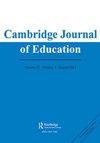Improving students’ academic performance and reducing conflicts through family involvement in primary school learning activities: a Mexican case study
IF 1.5
3区 教育学
Q2 EDUCATION & EDUCATIONAL RESEARCH
引用次数: 3
Abstract
ABSTRACT Research shows that family involvement in learning activities at school improves students’ academic performance and social cohesion. This study analyses the impact of involving families through interactive groups, dialogic literary gatherings and tutored library in a Mexican primary school in a highly underprivileged urban area, within the framework of the Schools as Learning Communities (SaLeaCom), project in Latin America. Using communicative methodology, data were collected through interviews (school principal and members of the non-profit Vía Educación which manages the project locally), focus groups (mothers, teachers and students), observations in classes, internal school reports and the comparative results of the national 2015 and 2018 standardised tests. Results show a drastic improvement in academic performance, surpassing the national average in mathematics and language by 15% and 5% respectively, and reducing conflicts in 61%. This provides evidence of how academic success and social cohesion are possible in a Mexican school like the one studied.通过家庭参与小学学习活动提高学生学习成绩并减少冲突:墨西哥个案研究
研究表明,家庭参与学校学习活动可以提高学生的学习成绩和社会凝聚力。本研究分析了在拉丁美洲学校作为学习型社区(SaLeaCom)项目框架下,通过互动式小组、对话式文学聚会和辅导图书馆,让家庭参与到一个高度贫困城市地区的一所墨西哥小学的影响。采用交流方法,通过访谈(学校校长和在当地管理该项目的非营利组织Vía Educación的成员)、焦点小组(母亲、教师和学生)、课堂观察、学校内部报告以及2015年和2018年全国标准化考试的比较结果收集数据。结果显示,学生的学习成绩大幅提高,数学和语言成绩分别超过全国平均水平15%和5%,冲突减少了61%。这提供了一个证据,证明在像所研究的那样的墨西哥学校里,学术成功和社会凝聚力是如何可能的。
本文章由计算机程序翻译,如有差异,请以英文原文为准。
求助全文
约1分钟内获得全文
求助全文
来源期刊

Cambridge Journal of Education
EDUCATION & EDUCATIONAL RESEARCH-
CiteScore
5.30
自引率
4.30%
发文量
35
期刊介绍:
Cambridge Journal of Education publishes original refereed articles on all aspects of education, with a particular emphasis on work that contributes to a shared understanding amongst academic researchers, theorists, practising teachers, policy-makers and educational administrators. The journal also welcomes the submission of systematic review articles that summarise and offer new insights into specific areas of educational concern. With a wide international readership, Cambridge Journal of Education publishes contributions drawn from different educational systems and cultures enabling continued in-depth discussion of global educational theory, policy and practice. The journal’s Special Issue programme encourages and stimulates focused discussion and engagement with significant themes and responses to topics raised by readers and contributors. Cambridge Journal of Education welcomes proposals for future editions.
 求助内容:
求助内容: 应助结果提醒方式:
应助结果提醒方式:


